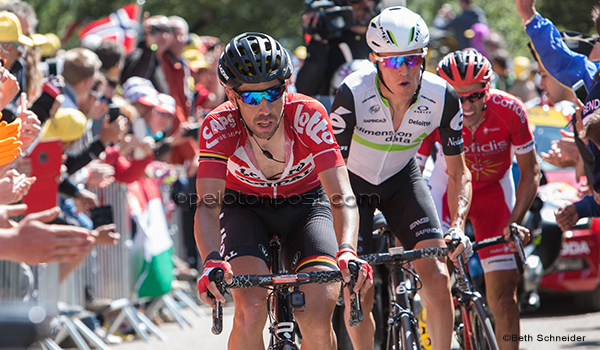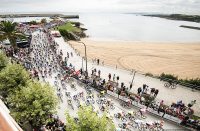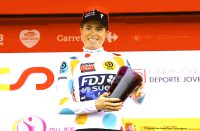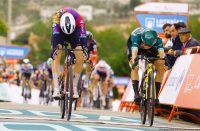Last year, Lotto Soudal was one of the most successful teams in the Vuelta a España by winning four stages. Tomasz Marczyński accounted for two of them by winning the sixth as well as the twelfth stage. Unfortunately, the Polish rider will not participate this year due to illness. The other two stage winners, Sander Armée and Thomas De Gendt, do line-up on the 25th of August and hope to compete for another stage win this year.
Sander Armée climbed to victory on the eighteenth stage of La Vuelta 2017 in a very impressive way. The Belgian formed part of a large breakaway, consisting of twenty riders with big names like Alaphilippe and Trentin among them. The hilly course with uphill finish seemed tailor-made for the strong Sander Armée as he placed several attacks and eventually dropped Lutsenko – the only one left from the initial breakaway – in the final kilometre. For the 31-year-old Belgian it was the biggest victory of his career. He also concluded the Vuelta with a nice result on the general classification, finishing nineteenth overall.
One year ago Thomas De Gendt was able to join the select group of riders who have won a stage in all three of the Grand Tours and thus completed his ‘grand slam’. After taking stage wins in the Tour de France and the Grio d’Italia, he realized his dream by also adding a victory in the Vuelta a España. In the nineteenth stage, De Gendt outsprinted his eight breakaway companions and claimed the fourth victory for Lotto Soudal.

The two Belgian winners look forward to the three-week stage race and elaborate on their ambitions for La Vuelta 2018.
Sander Armée: “I want to approach this Vuelta in the same way as I approached it last year. I believe my chances for another stage win will be the highest towards the end of the race. Like last year, we have a strong team, consisting of riders who want to race offensively. By riding this way, Thomas De Gendt, Tomasz Marczyński and I were able to take those stage wins last year. So we have to make sure to be in the right breakaway and not wait for the final kilometres to attack.”
“I’m not focusing on any particular stage yet, but I think there will be more opportunities for me in the second and third week of the race. The fight for the general classification will be more or less settled at the end, which will give the escapees more chance to stay ahead of the peloton. In all of the Grand Tours I’ve ridden so far, I didn’t lose much power towards the end – in contrast with other riders. In the flat stages I try to save as much energy as possible, so I still have power to attack in the hillier and mountainous stages. The stages to Andorra at the end of the race appeal to me. They are very tough, and I’m not sure if the breakaway will be given much space, but I’m really looking forward to those stages.”
“I prepared myself in the same way as I did last year. After the Belgian Road Championships, I took some rest before heading to Livigno for an altitude training camp. Afterwards, I spent a week in France training and I participated in the Tour de Pologne. It was never my intention to finish this tour with a solid overall result, so I raced there to assess my shape. And my legs felt good in Poland, so I’m ready for the Vuelta.”
“The general classification is not a goal right away. If I’m able to perform consistently during the three weeks, we still could see and evaluate if a strong result on the GC is possible. Last year, I secured my place in the top twenty, which was definitely something to be proud of. Yet, my stage victory topped the entire Vuelta. Either way, I’ll be at the starting line well prepared and really motivated.”
Thomas De Gendt: “After finishing the Tour de France, I took some rest and completed a couple of trainings. In 2016 I did an altitude training camp between the two Grand Tours, but that didn’t turn out well for me, so I prepared myself in a similar way as I did last year by training in Calpe for ten days: at sea level, yet in the mountains. The focus of these training days was mainly on staying in shape and improving that shape. I’m feeling ready for the Vuelta now.”
“Like Sander, I hope to take another stage victory this year. There are several stages where I can take my chance – especially in the first and second week of the race. I will mainly focus on those weeks, since the third week features only flat stages or mountain stages that are just too much climbing for me. The KOM jersey is not really a goal, but you never know… If I manage to be in the right breakaway a couple of times and could grab enough points, the mountains classification could become a goal. Furthermore, I want to help neo-pro Bjorg Lambrecht in his first Grand Tour by showing him the ins and outs of a three-week stage race. And then I also want to support teammates like Armée and Monfort, who may not hold any ambitions for the general classification at first, but might target a solid GC result along the way. They can count on me in flat stages to help setting the pace as well as in the mountain stages that are too difficult for me. But if I see any opportunity to aim for a stage win, I’ll take my chance, of course.”
“The course of the Vuelta doesn’t necessarily suit me better than the one of the Tour de France. The big difference is probably the way riders approach the two Grand Tours. There is less stress and pressure in the Vuelta. After four days of racing, there’s already a difficult stage with an uphill finish that will give the GC contenders a good indication quite early in the race, whereas in the Tour de France, there are still about 70 men that could take over the yellow jersey after nine days of racing. The course of the Vuelta also attracts less sprinters, which makes that there will only be three to four sprinters’ teams to control the race. Hence it’s the more relaxed way of racing that suits me better, not the course specifically.”
“Many riders also see the Vuelta as a preparation for the upcoming World Championships and for some it’s also the second Grand Tour of the season. While everyone is at their top level in the Tour, the fatigue and motivation to race become more important in the Vuelta, towards the end of the season. The strength and shape of the riders differ less in the Tour, which also results in less chances for the breakaway. Therefore, the Vuelta offers more opportunities to stay ahead of the chasing and stressed-out peloton. Either way, I’m still motivated to race and to be battling again for that stage victory.”




